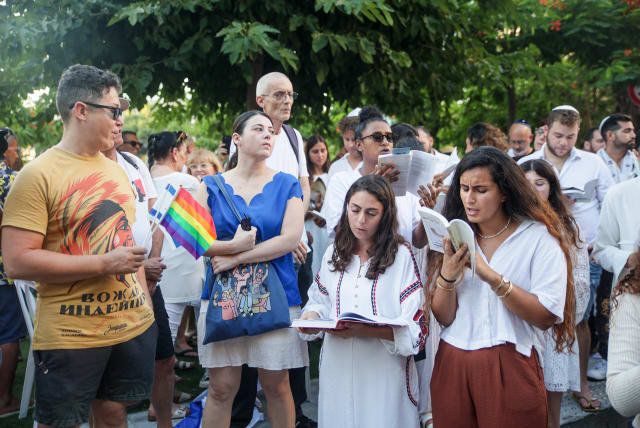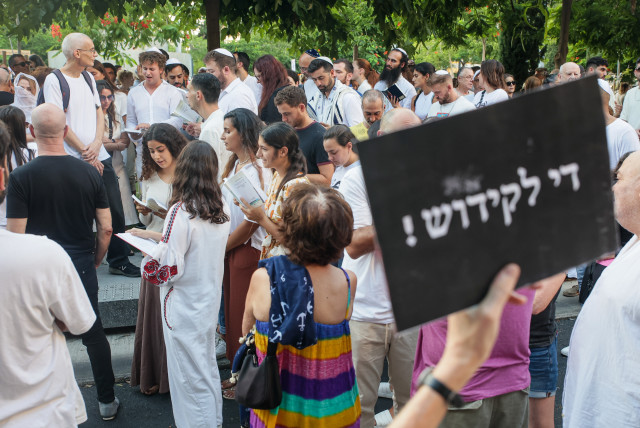More Israelis support allowing public segregated prayer than not - poll

The polls also found that most Israelis think that Prime Minister Benjamin Netanyahu's recent visit to New York went well.
More Israelis support allowing public gender-segregated prayer than oppose such prayer, according to new polls by N12 and KAN published on Tuesday.
According to N12, 48% of Israelis support allowing gender-segregated prayer in the public sphere, while 42% are against. According to KAN, 47% support allowing such prayer, while 34% are against.
The poll comes after worshippers and protesters clashed in Tel Aviv on Yom Kippur after a temporary partition to separate men and women was put up at a Yom Kippur prayer service at Dizengoff Square. The Tel Aviv Municipality had banned the use of such a partition in the public sphere and the High Court had upheld the municipality's right to issue such a ban ahead of the holiday.
Gantz, Netanyahu continue to battle for lead in polls
The polls also examined how the Knesset would look if elections were held today, with KAN finding that Benny Gantz's National Unity Party would lead with the largest number of mandates, while N12 found that Prime Minister Benjamin Netanyahu's Likud would lead.
According to KAN, National Unity would earn 30 seats, Likud would earn 27 seats, Yesh Atid would earn 18 seats, Shas would earn 10 seats, and the Religious Zionist party would earn nine seats. Meanwhile, United Torah Judaism would earn seven seats, Yisrael Beytenu, Ra'am, and Hadash-Ta'al would earn five seats each, and Meretz would earn four seats.
The poll would leave the opposition with 62 seats and the coalition with 53 seats, as Hadash-Ta'al does not join coalitions.
According to N12, the Likud would earn 28 seats, National Unity would earn 27 seats, Yesh Atid would earn 18 seats, Shas would earn 10 seats, and the Religious Zionist Party would earn nine seats. Meanwhile, United Torah Judaism would earn seven seats, Yisrael Beytenu would earn six seats, and Ra'am, Hadash-Ta'al, and Meretz would earn five seats each.
The poll would leave the opposition with 61 seats and the coalition with 54 seats, as Hadash-Ta'al does not join coalitions.
In response to a question by KAN about who would be better as prime minister, respondents were split evenly, with 39% preferring Netanyahu and 39% preferring Gantz.
In response to a similar question by N12 about who would be better as prime minister between Gantz and Netanyahu, 37% said Netanyahu would be better, while 35% said Gantz would be better. With Yesh Atid head Yair Lapid and Netanyahu as the options, 39% said they prefer Netanyahu, while 29% preferred Lapid.
The N12 poll also asked if Lapid and Gantz should join a government with Netanyahu if Otzma Yehudit head Itamar Ben-Gvir and Religious Zionist Party head Bezalel Smotrich leave due to the conditions of a future normalization deal with Saudi Arabia, with 47% saying they shouldn't join the government and 36% saying they should.
N12 also queried how the public felt about Netanyahu's recent visit to the US, finding that 22% thought the visit went very well, 27% thought it went decently, 18% thought it went fairly badly, and 17% thought it went very badly.
Jerusalem Post Store
`; document.getElementById("linkPremium").innerHTML = cont; var divWithLink = document.getElementById("premium-link"); if (divWithLink !== null && divWithLink !== 'undefined') { divWithLink.style.border = "solid 1px #cb0f3e"; divWithLink.style.textAlign = "center"; divWithLink.style.marginBottom = "15px"; divWithLink.style.marginTop = "15px"; divWithLink.style.width = "100%"; divWithLink.style.backgroundColor = "#122952"; divWithLink.style.color = "#ffffff"; divWithLink.style.lineHeight = "1.5"; } } (function (v, i) { });

